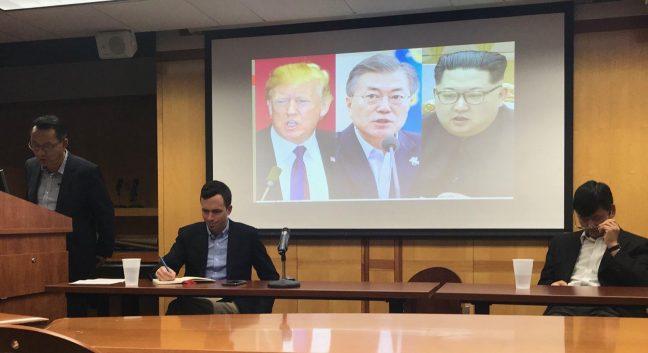Two professors discussed the realities behind the North Korean denuclearization negotiations Wednesday night in a talk hosted by University of Wisconsin-Madison Center for East Asian Studies.
Uk Heo, a political science professor at UW-Milwaukee, and Gi-Wook Shin, a sociology professor at Stanford University, said the June 12 meeting in Singapore between President Donald Trump and North Korean leader Kim Jong Un resulted in no tangible agreement for denuclearization.
No agreement has been made to satisfy the U.S. desire for unilateral nuclear concession because North Korea has a totally different perspective on the matter, Heo said.
“They have no confidence in each other,” Heo said. “In other words, they have no idea what the other is thinking. That is why this process has been very difficult.”
US should learn to live with a nuclear North Korea, panelists say
Conflicting perspectives between the U.S. and North Korea is not a new issue, however. Talks about denuclearizing North Korea started in 2005, and Shin likened the continuing issue as like watching the same movie over and over but with different actors.
Talks began after North Korea withdrew from the Treaty on the Non-Proliferation of Nuclear Weapons Treaty in 2003. The treaty aimed to promote peaceful cooperation among countries by reducing the spread of nuclear weapons.
North Korea would like to keep their nuclear weapons for regime survival, Heo said, a position at odds with their neighbors to the south. In South Korea, there is division about how to deal with North Korea’s nuclear weaponry. The more liberal parties view them as fellow Koreans and try to engage them in talks about their usage of nuclear technology by providing economic aid. North Korea, in turn, has used the aid to their advantage.
More conservative parties have the opposite approach, and view North Korea as the enemy, Heo said.
Wisconsin Republicans criticize Trump’s plans for tariffs, citing price increases, trade tension
In response to an audience question about what war would look like between the U.S. and North Korea, Heo was hesitant to answer since he said it depends on who starts the war and how the other side responds.
Shin, answering an audience question about the potential effect of China and U.S. “trade war” on denuclearization negotiations, said the U.S. needs help from China with negotiations. Unfortunately, he said, Trump does not seem to have a clear strategy for dealing with either China or North Korea.

















